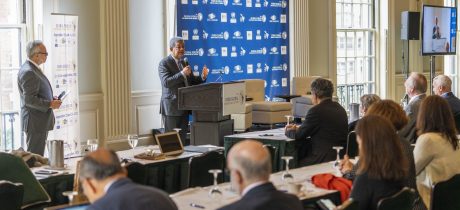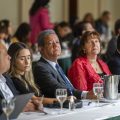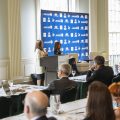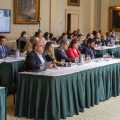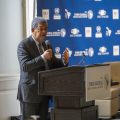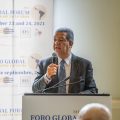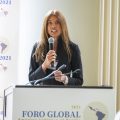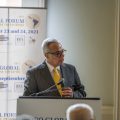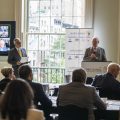The Forum will take place September 22 and 23 in New York City and will analyze the future of Latin America and the Caribbean from different perspectives, with the participation of renowned academics, former Presidents and representatives of multilateral organizations.
NEW YORK – The former President of the Dominican Republic, Leonel Fernández, stated today that the solidarity and cooperation of the most developed nations towards developing countries have been absent during the crisis of the Covid-19 pandemic.
Fernández expressed his views during the inaugural ceremony of the third Global Forum on Latin America and the Caribbean, an event that will take place in this city with the participation of several former Presidents, as well as international experts.
In his opening remarks Fernández stated that as a result of the pandemic, the debt of the least developed countries has increased significantly while the solidarity support promised by the developed nations has remained in the realm of rhetoric.
The former Dominican President indicated that although production activities in Latin America and the Caribbean have experienced some improvement due to the measures introduced to control the pandemic, this does not mean that the region is effectively recovering financially.
Along those lines, Fernández also explained that the crisis generated by the pandemic must be taken advantage of in order to achieve an inclusive society, and encouraged moving forward to effectively achieve the Sustainable Development Goals outlined by the United Nations (UN).
During the opening session of the Forum Kevin Casas-Zamora, director of the International Institute for Democracy and Electoral Assistance (IDEA International), reiterated that the Latin American and Caribbean regions face the challenge of defending democracy against populist tendencies.
In Casas-Zamora’s opinion, the crisis generated by the pandemic must be used to rethink democracy in the region in light of what he called a host of “enlightened prophets.”
He also stated that although there are great challenges in the region for the immediate future, the Latin American and Caribbean democratic electoral system can exhibit many great achievements and that these must be defended.
“The pandemic has revealed, for example, that in Latin America we can organize fair elections, as we have seen in the cases of Bolivia, Mexico, Peru, the Dominican Republic, among others, and this is crucial,” said the director of IDEA International.
“The most democratic achievement in Latin America is to have chosen the electoral path, to choose that legitimate way to access power,” he said. He added that “this is no small task,” when until recently power was elucidated in the mountains or in army barracks.
Casas-Zamora thanked the Global Foundation for Democracy and Development (FUNGLODE), as well as former President Fernández, for making the Forum possible. He also stated that the former President has managed to turn the Forum into an unavoidable and important occasion where experts can reflect on the current state and future of the region.
Likewise, he highlighted the work carried out by Daniel Zovatto, Regional Director of IDEA International for Latin America and the Caribbean, whom he considered a tireless weaver of the networks that help think about the region and work so that democracy is able to establish roots in it.
Zovatto is the forum’s Technical Director, along with Natasha Despotovic, Executive Director of the Global Foundation for Democracy and Development (GFDD), Funglode’s sister institution in the United States.
“This Forum has never been more necessary. The pandemic has revealed many things about the world, about Latin America, and about the challenges facing democracy,” Casas-Zamora said.
“It is urgent that we collectively try to shed some light on the reality of what is happening around us: the current problems of democracy are really serious,” he added, noting that the quality of democracy is declining rapidly around the world.
He also stated that the most democratic achievement of Latin America is to have chosen the electoral route to access power. “The electoral route is the only safety valve that exists for political systems under enormous levels of pressure, such as those in Latin America at the moment,” he said.
“This must be preserved at all cost,” Casas-Zamora said.
The Latin America and Caribbean Global Forum is organized by FUNGLODE and its sister institution in the United States, the Global Foundation for Democracy and Development (GFDD), with the collaboration of IDEA International.
Key participants in the Forum, which will conclude this coming Friday afternoon, include former Presidents Ricardo Lagos, from Chile; Ernesto Samper, from Colombia, and Laura Chinchilla, from Costa Rica. Also, heads of regional organizations, as well as academics and experts who will address the future of the region in various areas, mainly the economic issues that currently impact Latin America and the Caribbean.

